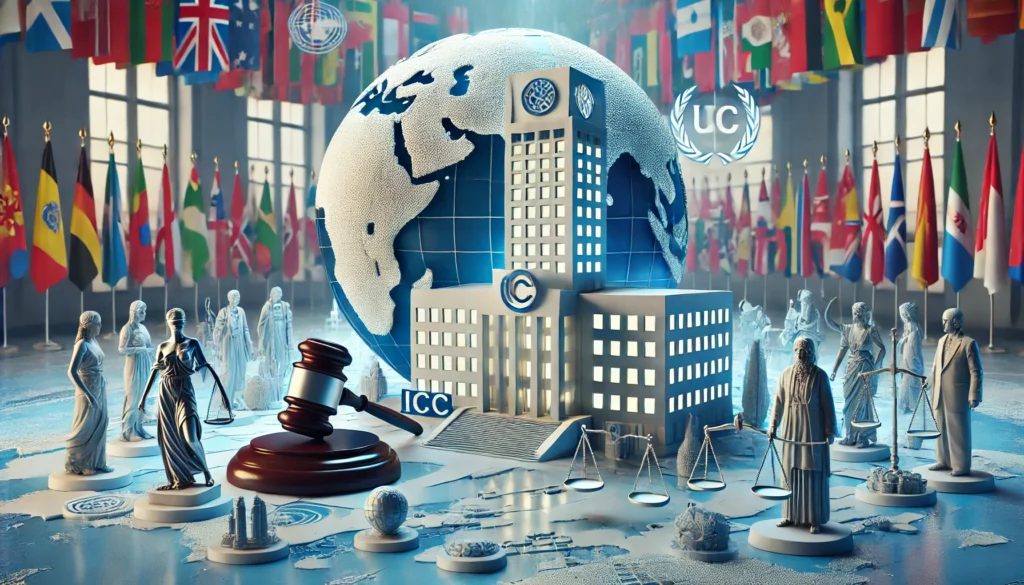Published On: 18th November, 2024
Authored by: Muskan Yadav
Amity University Gurgaon
Abstract [1]
The United Nations (UN) has undertaken a crucial responsibility in protecting peace and assurance of global security, which is one of the central objectives stated in its Charter. Established in 1945, the goal of this organization is to avert wars, engage in disagreements mediation, and push friendly relations between states. The Security Council is the main organ responsible for determining the threats to peace and suggesting actions like sanctions or military interventions if warranted. It uses various tools including administering peacekeeping missions, conducting diplomatic actions, and returning fire in case of civil conflicts as a way to save lives.
UN peace operations commonly referred to as Blue Helmets are particularly important in ensuring there are conditions for sustainable peace in post-war societies. Moreover, the UN engages itself in peacebuilding processes with an aim to restore governance systems assisting human rights as well as facilitating democracy processes. UN’s mission calls for addressing the fundamental reasons of conflicts including poverty and instability so that future violent eruptions can be avoided by any chance.
In recent times, however; new forms of terrorism as well as transnational organized crimes have emerged which were considered as threats by the UN hence leading adoption of collective security principles as well international cooperation sentiments. With this varying approach; it remains clear that the UN is a pivotal element in the quest for worldly tranquillity and order.
Keywords
United Nations, International Peace, Security Council, Conflict Resolution, Diplomacy
Introduction
The UN founded in World War II is an organization committed by different countries to sustaining peace, and security and working together globally. The aim of the UN was to avoid destructive wars and facilitate inter-state dialogue when its charter came into existence on June 26, 1945. The overarching goal of the UN is to keep the world peaceful and secure as stated in its Charter’s Article 1 which accentuates promoting friendly relations among countries as well as enhancing social progress.
[2]Security Council is the key organ for peace and security efforts within the UN system. It is a unique entity that has power towards mandatory decision-making powers over states’ members. Indeed, it illegalizes threats to peace, creates the ground for peacekeeping missions according to international humanitarian principles, and imposes sanctions to resolve conflicts. The actions of the Council are often burdened by the concept of collective security which indicates that an attack on any member is an attack on everybody and provokes a united reaction against aggression.
Apart from the Security Council, the UN utilizes various mechanisms and strategies for conflict prevention, resolution, and peacebuilding. These include diplomatic negotiations; mediation attempts as well as deployment of peacekeeping forces in order to stabilize regions experiencing turmoil. Moreover, it is important for the UN to address the underlying issues that cause conflict such as poverty, inequality, and human rights violations if they want to achieve everlasting peace.
With constant changes happening globally, new challenges that face the UN include terrorism, climatic changes, and a rise in non-state actors. Such complexities require a flexible and adaptable approach to peace and security thereby emphasising on UN’s role in international relations. Its multifaceted initiatives and collaborative efforts toward creating a more peaceful world, show its persistent relevance in the 21st century.
Historical Background
In recent years, the UN has increasingly focused on addressing the root causes of conflicts through development assistance programs aimed at poverty alleviation and social justice promotion. To this end, it has established a range of mechanisms for conflict prevention including diplomatic initiatives, mediation efforts, and peacebuilding missions. Furthermore, the UN remains committed to promoting a fair international economic order that can contribute to global stability.
In addition to this long-term approach to peacebuilding, the UN also provides humanitarian aid during crises. This is aimed at addressing immediate needs like food provision after a disaster or medical support in case of an epidemic outbreak or war injuries. Even though humanitarian assistance is vital during emergencies, it should be noted that it alone does not guarantee sustainable peace in conflict-ridden areas. Such assistance must be accompanied by other measures aimed at transforming unstable societies into prosperous ones. As much as possible, therefore, supporting peacekeepers through the provision of adequate funding ensures that they move beyond mere policing into rebuilding societies affected by wars.”
This paragraph demonstrates how important the role of the UN is in restoring peace globally starting from its basic principles that were formulated after World War II; this happened intending to prevent any future massive wars that could cause global chaos like those experienced during two World Wars before”.
Comparison with other countries
If you compare the wisdom of different people with the UN peacekeeping operations, some key differences will arise. UN has shown its ability to stabilize conflict zones and reduce violence in ‘blue helmet’ missions but US military interventions in Iraq are mostly driven by selfish interests rather than establishing peace. However, these operations are often perceived as driven by self-aggrandizement rather than an honest dedication to fixing things. This eventually serves to weaken our action toward improved international security.
The AU and the EU also actively participate in peacekeeping and the resolution of conflicts in a myriad of ways. Notably, AU’s peacekeeping missions in Somalia and South Sudan have both shown some promise and faced limitations. The AU has been able to deploy troops to meet urgent security needs but often lacks them due to resource constraints and sometimes little political backing just like UN operations do. By virtue of legitimacy bestowed on it by the UN Charter and consent from host nations, participation of the UN in peacekeeping activities is therefore viewed as a more desirable method of conflict resolution than unilateral military approaches by individual states. On the other hand, the success or failure of UN peacekeeping largely depends on the political environment at large as well as other international actors working together towards that goal. In the end, while UN peacekeeping has served to maintain peace and security internationally effectively; its effectiveness varies widely with each situation depending on such factors as specific geopolitical contexts as well as availability of resources for supporting the mission being conducted.
Causes
Conflicts that threaten international peace and security arise from various interconnected causes. First, competition over scarce resources, such as oil and water, can lead to tensions and violence, especially when coupled with unequal wealth distribution and perceived injustices. Second, weak or failed states often create power vacuums, allowing non-state actors like rebel groups or terrorists to emerge and destabilize regions. Third, poverty and lack of economic opportunities can foster frustration and hopelessness, making individuals more susceptible to recruitment by extremist organizations. Fourth, territorial disputes and the quest for self-determination by ethnic or religious groups can ignite armed conflicts, as seen in various global hotspots. Lastly, the impacts of climate change, including resource scarcity and environmental degradation, exacerbate existing tensions and can lead to conflict over access to essential resources. Addressing these complex causes is essential for the UN and the international community to effectively maintain peace and security worldwide.
Guidelines
The United Nations peacekeeping operations are organized based on guiding principles that have evolved to answer the perplexities of contemporary conflicts. At the very heart of these operations are three main principles: consent of the parties concerned; impartiality; and non-use of force except for self-defense and defense of the mandate. These ensure that peacekeeping missions have legitimacy and are cognizant of the sovereignty of host nations. In addition, building national and local ownership of peace processes is emphasized by the UN through engaging with local communities as well as governments in order to promote trust and cooperation. The Capstone Doctrine outlines core objectives and success factors when it comes to UN peacekeeping which includes the promotion of human rights, protection of civilian populations, support of political processes as well as rule of law. Additionally, ongoing reforms like Action for Peacekeeping (A4P) strive to improve UN operations towards sustainable security hence facing complex settings during peacekeeping missions.
Interpretations
The interpretations of the role of the United Nations (UN) in maintaining international peace and security have evolved significantly over time, particularly in response to changing global dynamics and the complexities of modern conflicts. At the heart of these interpretations are UN peacekeeping principles: consent, impartiality, and force only in self-defense. Nevertheless, the implementation of these principles has been subject to reinterpretation, especially with the rise of the “protection of civilians” (PoC) norm. This shift has moved away from the conventional understanding that force is limited to self-defense situations and embraced a more proactive use of force for civilian protection.
The historical context has also influenced the UN’s approach to peacekeeping such as its operations in former Yugoslavia and Rwanda which underscored how crucial effective civilian protection measures were. In response, many peacekeeping mandates now include language relating to responsibility for protecting civilians thereby sometimes detaching ‘imminent’ from its traditional meaning which raises many legal and moral questions concerning the use of violence during peacekeeping missions.
Moreover, the interpretation of the UN’s role is deeply influenced by the need to support political processes, as evinced in the notion of politics being given priority. It is pointed out that peacekeeping operations are not just military missions but they are essentially related to wider political resolutions and the achievement of lasting peace.
In conclusion, the UN’s role in international peace and security reflects an interaction between established principles and the changing circumstances of global conflicts requiring continuous thinking and adjustment to effectively tackle contemporary peacekeeping challenges.
Conclusion
In wrapping up, it can be said that the United Nations has vital importance in the preservation of international peace and safety by means of its elaborate legal frameworks of principles, operations for peacekeeping, as well as through diplomatic efforts. The UN Charter functions as the basis for its power; Thus, enabling the Security Council to take collective actions against threats to global stability. With different peacekeeping missions including United Nations Truce Supervision Organization and United Nations Interim Force in Lebanon among others, the UN has shown its potential towards stabilizing conflict zones and creating an environment conducive to peace. Besides, the establishment of international criminal tribunals such as ICTY reiterates the UN’s determination on rules of law coupled with accountability even amid grave human rights abuses.
Moreover, the evolving doctrine of the Responsibility to Protect reflects the UN’s recognition of the need for timely intervention in situations of mass atrocities, reinforcing its moral obligation to safeguard human rights. While the UN faces ongoing challenges, including resource constraints and geopolitical complexities, its multifaceted approach to conflict resolution remains essential in addressing the root causes of violence and promoting sustainable peace. Ultimately, the UN’s efforts in maintaining international peace and security not only contribute to global stability but also reflect the collective aspiration for a more just and peaceful world.[3]
Reference(s):
[1] https://www.eda.admin.ch/eda/en/fdfa/foreign-policy/international-organizations/un/un-peace-security.html
https://www.britannica.com/topic/United-Nations/Functions
[2][2] https://unis.unvienna.org/unis/en/topics/peace-and-security.html
https://unis.unvienna.org/unis/en/united_nations/un_peace-and-security.html




